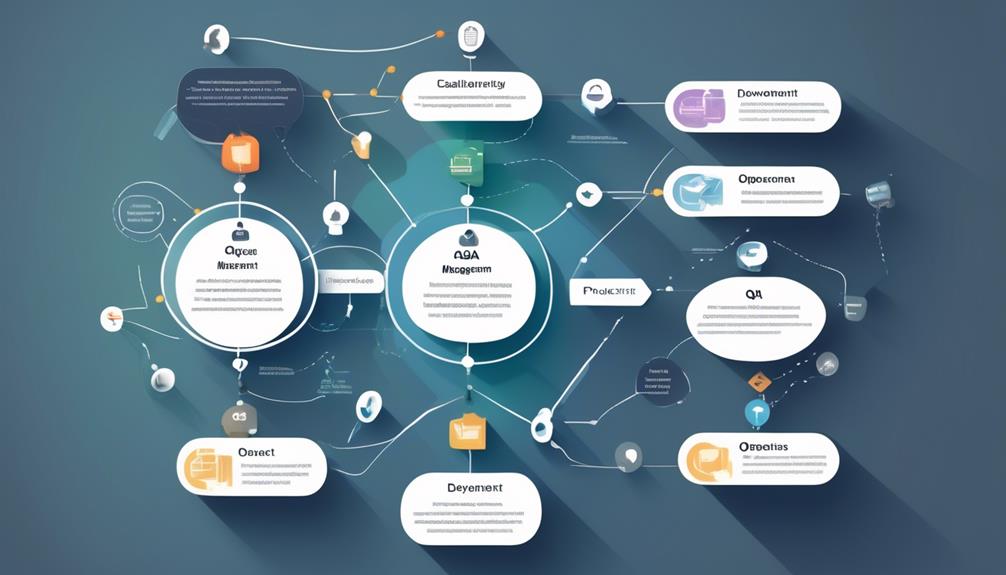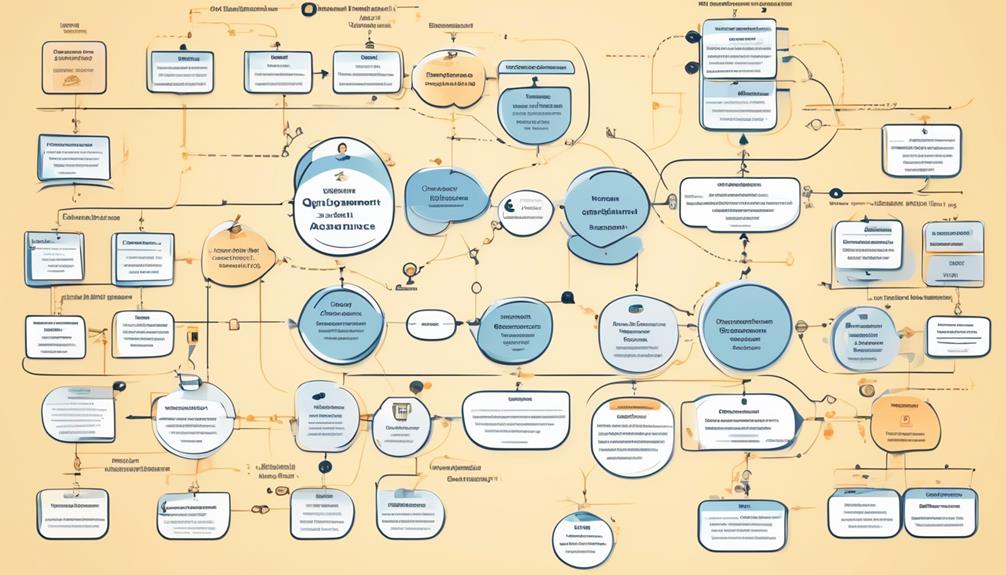Have you ever thought about the intricate web of interactions that Quality Assurance (QA) professionals navigate on a daily basis?
From collaborating with the development team to working closely with project managers, business analysts, product owners, and stakeholders, QA's interaction with various parts of an organization is essential for ensuring the quality of the final product.
But what exactly does this collaboration entail and how does it impact the overall success of a project?
Let's explore the intricate relationships that QA professionals cultivate within an organization and the significance of these interactions in delivering high-quality software solutions.
Key Takeaways
- QA works closely with development teams to foster communication, share test plans, provide feedback on development progress, identify and resolve defects, and improve QA processes and tools.
- QA interacts with project management to align testing activities with project timelines and deliverables, provide feedback on software quality, prioritize and manage defects and issues, and allocate testing resources effectively.
- QA coordinates with operations teams to support software deployment and maintenance, conduct tests to verify product quality and functionality, ensure adherence to business requirements, assist in the deployment process, and streamline coordination through automation.
- QA engages with product management to define test strategies based on product requirements, provide feedback on testing outcomes and user feedback, collaborate on prioritizing and planning product releases, gather and analyze customer feedback, and maintain focus on product quality and user satisfaction.
QA and Development Teams Collaboration
QA collaborates closely with development teams to ensure that software meets quality standards and requirements, fostering frequent communication, test plan sharing, and feedback on development progress. This collaboration is essential for effective software testing and bug resolution.
As QA professionals, we work hand in hand with software developers to identify, report, and resolve defects, ensuring that the software is robust and reliable. Our communication skills are critical in conveying bug reports and providing feedback on the software's quality.
Together with the development team, we establish and improve the QA process, testing methodologies, and tools to enhance the overall testing strategy. By working closely with the development team, we ensure that the final product meets user expectations and business requirements.
This collaboration not only strengthens the quality assurance efforts but also fosters a cohesive and efficient development environment. The synergy between the QA team and the development team is instrumental in delivering high-quality software products.
QA and Project Management Interaction

As we collaborate closely with development teams, our interaction with project management becomes essential to align testing activities with project timelines and deliverables. Our engagement with project management is crucial for the success of the entire project and the quality of the final product.
Here are some key aspects of the QA and project management interaction:
- Timeline Alignment: We work with project managers to ensure that testing activities are scheduled in coordination with the project timeline, ensuring that testing milestones align with project deliverables.
- Feedback on Software Quality: QA provides valuable feedback to project managers about the quality and readiness of the software for deployment, helping them make informed decisions about the product's release.
- Defect Prioritization and Management: Collaborating with project managers, QA prioritizes and manages defects and issues identified during testing, ensuring that critical issues are addressed promptly.
- Resource Allocation: QA and project management work together to ensure that testing resources and efforts are allocated effectively to meet project goals, optimizing the overall testing process.
This close interaction ensures that the testing process integrates seamlessly with the project management efforts, contributing to the successful delivery of high-quality products.
QA and Operations Coordination
Coordinating closely with operations, we ensure the smooth deployment and maintenance of the software. Quality assurance (QA) plays a critical role in the software development process by collaborating with operations to support the development team in maintaining product quality and improving user experience. QA team leads and engineers work diligently to integrate QA processes with operations, ensuring that the software testing processes are aligned with the deployment and maintenance needs.
Our team's involvement in operations coordination encompasses various aspects. We're responsible for conducting tests to verify product quality, evaluate functionality, and ensure adherence to business requirements. Additionally, we play a crucial role in deployment, being on call, conducting smoke tests, and ensuring a smooth deployment process. Through automation, we streamline these processes, enabling efficient coordination between QA and operations.
QA and Product Management Engagement

Working closely with Product Management, we engage in understanding and prioritizing product requirements and features. This collaboration is essential for ensuring the alignment of our testing methodologies with user requirements and product quality standards. Our engagement with Product Management encompasses several key activities:
- Defining test strategies in collaboration with Product Managers to ensure that all user stories and acceptance criteria are met.
- Providing feedback to Product Management based on testing outcomes and user feedback, contributing to continuous product improvement.
- Collaborating to prioritize and plan product releases, balancing quality and time-to-market considerations.
- Gathering and analyzing customer feedback in coordination with Product Management to ensure that it aligns with product goals and quality standards.
This active engagement with Product Management allows our QA team, including QA managers, test engineers, and QA analysts, to contribute to the overall success of software development by maintaining a focus on product quality and user satisfaction.
QA and Customer Support Collaboration
Collaborating closely with customer support, we integrate feedback and insights to enhance our testing processes and ensure the software meets user expectations and delivers a seamless experience. Customer support provides invaluable insights into common user issues and pain points, allowing QA to prioritize and address critical issues effectively.
By working together, QA and customer support create comprehensive test cases and scenarios based on real user interactions, leading to a more thorough quality assurance process. This collaboration also ensures that the software aligns with customer expectations, ultimately resulting in a higher quality product.
As QA engineers, it's our responsibility to incorporate customer feedback into our testing procedures, allowing us to identify and rectify potential issues before they impact the user experience. The QA team lead plays a crucial role in facilitating this collaboration, ensuring that the insights from customer support are effectively integrated into test management and the overall quality assurance process.
The synergy between QA and customer support is fundamental in delivering software that not only meets technical requirements but also fulfills user needs and expectations.
Frequently Asked Questions
Who Does QA Work With?
QA collaborates with diverse teams within an organization, including developers, project managers, business analysts, automation engineers, and end-users.
We analyze requirements, report bugs, and ensure software consistency with developers.
With project managers, we plan testing activities, set objectives, and allocate resources.
We also interact with business analysts to understand user expectations and verify software functionality.
Additionally, we coordinate with automation engineers to implement and maintain automated testing frameworks and scripts.
Which Department Is QA Under?
QA operates independently within the organization, reporting to senior management. This structure allows us to maintain objectivity and uphold quality standards across all departments.
Our autonomy enables us to provide unbiased insights and recommendations, ensuring that the entire organization is aligned with the highest quality standards.
We actively engage with all departments to uphold a culture of quality and continuous improvement throughout the organization.
What Is QA Organizational Structure?
In our organizational structure, QA collaborates with various departments, including development, product management, and operations. We ensure alignment with development teams to implement efficient testing practices and address quality concerns.
Additionally, we work closely with product management to understand customer needs and translate them into testable requirements. Collaborating with operations teams allows us to validate software performance in real-world environments.
This cohesive approach ensures comprehensive quality assurance across the organization.
Where Does QA Fit?
In the grand scheme of operations, QA fits as the essential bridge that ensures seamless quality throughout the organization's processes. Our role extends beyond mere testing; we intertwine with developers, project managers, and fellow QA professionals to plan and execute comprehensive testing strategies.
We're the guardians of quality, aligning testing requirements with available resources and competencies while collaborating with production and deployment teams to ensure a flawless product journey.
Conclusion
In conclusion, QA acts as the glue that holds the different parts of an organization together, like a conductor orchestrating a symphony.
By collaborating with development teams, project managers, operations, product management, and customer support, QA ensures that the software meets requirements and functions effectively.
This collaboration and coordination are essential for delivering high-quality products and satisfying stakeholders.









